Affirmative Sentences
- I have finished the report.
This is a sentence in the present perfect tense.
We know it is in the present perfect tense because it has the auxiliary verb HAVE (or HAS) followed by a PAST PARTICIPLE.
Look at the structure for affirmative sentences in the present perfect tense. The word order is:
subject + have / has + past participle
Past Participles
The past participle can be regular or irregular.
Let’s look at the present perfect tense with regular past participles.
Regular past participles end in ED.
Some example sentences:
- I have finished the report.
- We have opened all of the windows.
- She has lived in Germany for ten years.
- He has called his mother twice today.
Notice how the past participle of these regular verbs is the same as the past simple tense form.
But some past participles are IRREGULAR. For example:
- I have been very busy this week.
(Been is the past participle of TO BE) - We have done our homework.
(Done is the past participle of TO DO) - She has spoken to a large audience many times.
(Spoken is the past participle of TO SPEAK) - Rob Woodward has taught English since 1997.
(Taught is the past participle of TO TEACH)
Notice how the past participle of these irregular verbs is different from their past tense form.
I recommend our lesson about 101 Irregular Past Participles with example sentences in English.
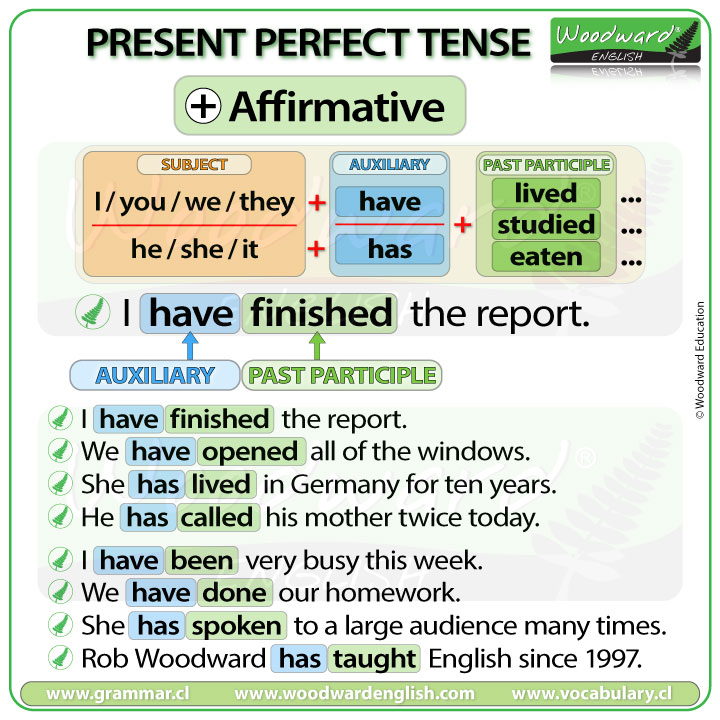
Present Perfect Tense Contractions – Affirmative Sentences
In spoken English, we almost always use contractions with the present perfect tense. We contract the subject and the auxiliary have / has.
For example: I have
We contract the subject I with the auxiliary HAVE which becomes I’VE … and then you can add the past participle.
Here is the list of present perfect tense contractions:
- I have ➡️ I’ve
- You have ➡️ You’ve
- He has ➡️ He’s
- She has ➡️ She’s
- It has ➡️ It’s
- We have ➡️ We’ve
- They have ➡️ They’ve
Let’s look at some example sentences.
Can you change these present perfect sentences to contain a contraction?
- I have finished the report.
- We have done our homework.
- She has lived in Italy for six years.
- John has been here before.
Here are the answers:
- I have finished the report. ➡️ I’ve finished the report.
- We have done our homework. ➡️ We’ve done our homework.
- She has lived in Italy for six years. ➡️ She’s lived in Italy for six years.
- John has been here before. ➡️ John’s been here before.
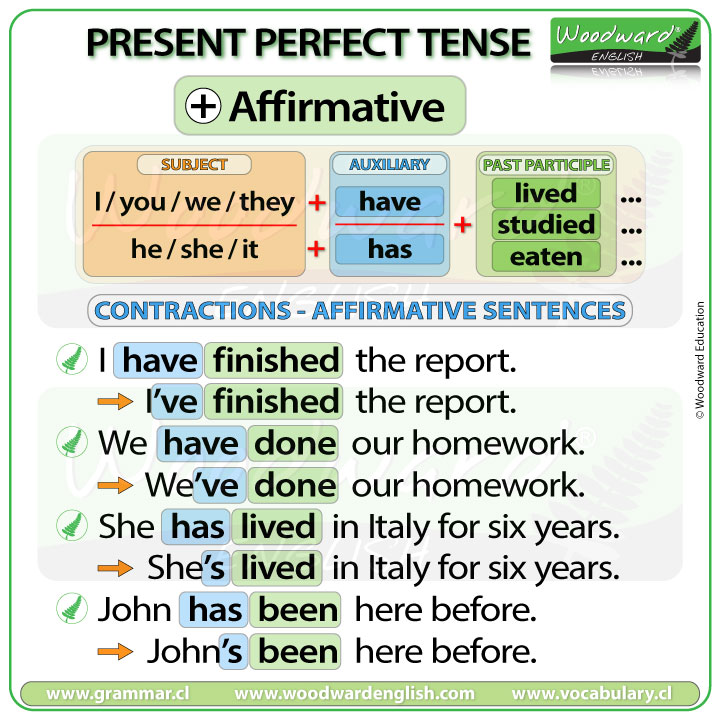
Now, let’s look at how to make negative sentences in the present perfect tense.
Present Perfect Tense – Negative sentences
Look at this affirmative sentence:
- I have finished the report.
There is the auxiliary HAVE and the past participle FINISHED.
How can we make this negative?
To create a negative sentence in the present perfect tense, we just add NOT between the auxiliary HAVE or HAS and the past participle.
- I have finished the report. (This is an affirmative sentence)
- I have not finished the report. (This is a negative sentence)
However, it is much more common to use a contraction in negative sentences.
You will normally hear:
- I haven’t finished the report.
Look at this affirmative sentence:
- She has seen the movie.
How can we make this negative?
To create a negative sentence in the present perfect tense, we just add NOT between the auxiliary HAVE or HAS and the past participle.
- She has seen the movie. (This is an affirmative sentence)
- She has not seen the movie (This is a negative sentence)
However, it is much more common to use a contraction in negative sentences.
You will normally hear:
- She hasn’t seen the movie.
Let’s look at some more examples of negative sentences in the present perfect tense:
- I haven’t cleaned the kitchen today.
- We haven’t finished our meal yet.
- It hasn’t rained this week.
- He hasn’t seen the movie.
Here is the summary chart to make negatives sentences in the present perfect tense.
We have the subject + negative auxiliary (haven’t/hasn’t) + past participle
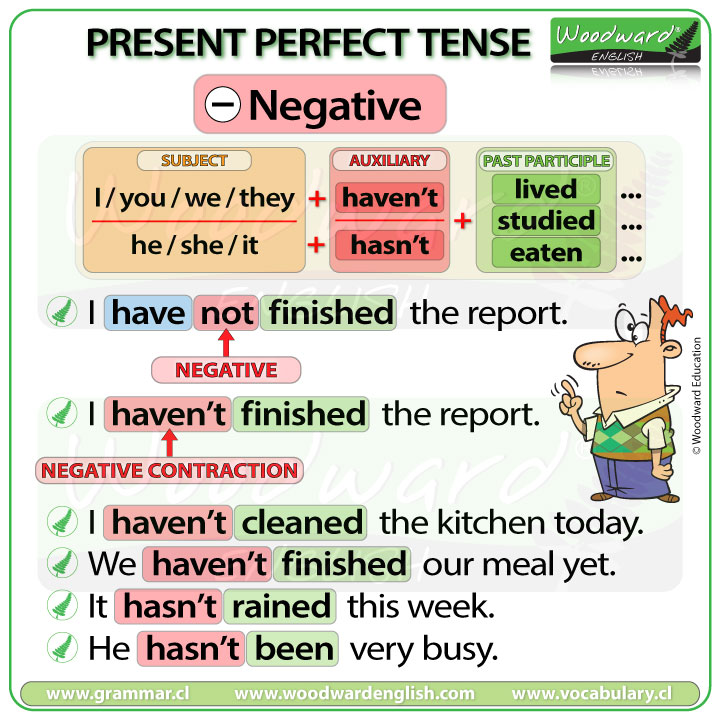
Present Perfect Tense – Questions
Look at this affirmative sentence:
- They have studied for the test.
It has the subject THEY, the auxiliary HAVE and the past participle STUDIED.
How can we change this into a question?
To make a question in the present perfect tense, we change the order of the subject with HAVE / HAS.
- They have studied for the test. … becomes …
- Have they studied for the test?
Look at this affirmative sentence:
- She has arrived early.
How can we make this a question? We change the order of the subject and the auxiliary. The question becomes…
- Has she arrived early?
Let’s look at some more examples of present perfect questions:
- Have you taken your medicine today?
- Have we finished for the day?
- Has the game started?
- Has she read the report? (Remember READ is the past participle of READ – yes, they have the same spelling but the pronunciation is different)
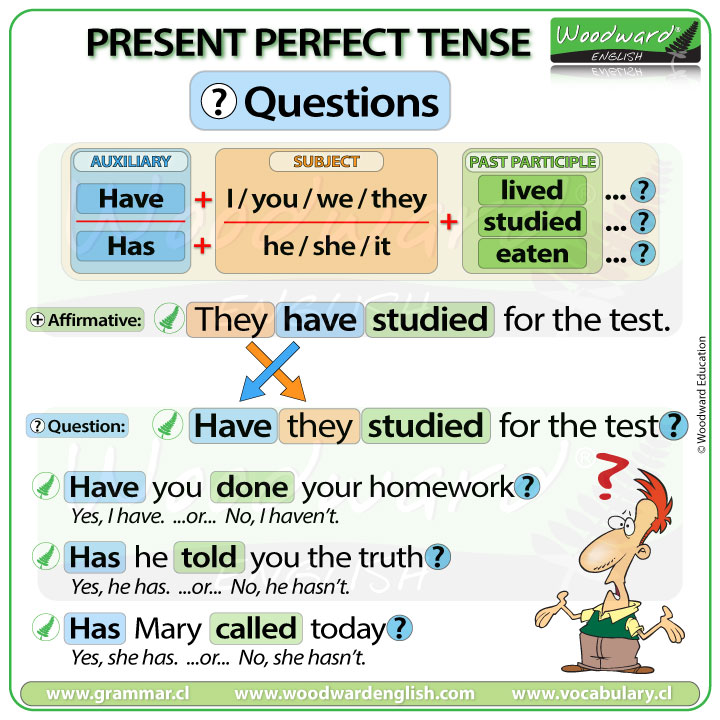
Present Perfect Tense – Short Answers
We can also give short answers to present perfect tense questions.
Look at these questions:
- Have you done your homework?
- Has he told the truth?
- Has Mary called today?
Obviously, you can reply with just YES or NO, but in reality, we almost always give a short answer.
Present perfect short answers use HAVE or HAVEN’T in them.
Let’s look at the first question:
- Have you done your homework?
Since this question is HAVE YOU…?
The short answers would be: Yes, I have. … or … No I haven’t.
- Have you done your homework? Yes, I have. … or … No, I haven’t.
What would the short answers be for the next two questions?
- Has he told the truth?
- Has Mary called today?
You could say:
- Has he told the truth? Yes, he has. … or … No, he hasn’t.
- Has Mary called today? Yes, she has. … or … No, she hasn’t.
Present Perfect Tense with Questions Words
We can also use question words (what, where, why, etc.) at the beginning of the question. For example:
- What have you done?
- Where has he gone?
- Why have they stopped?
- How has she felt today?
Present Perfect Tense Summary Chart
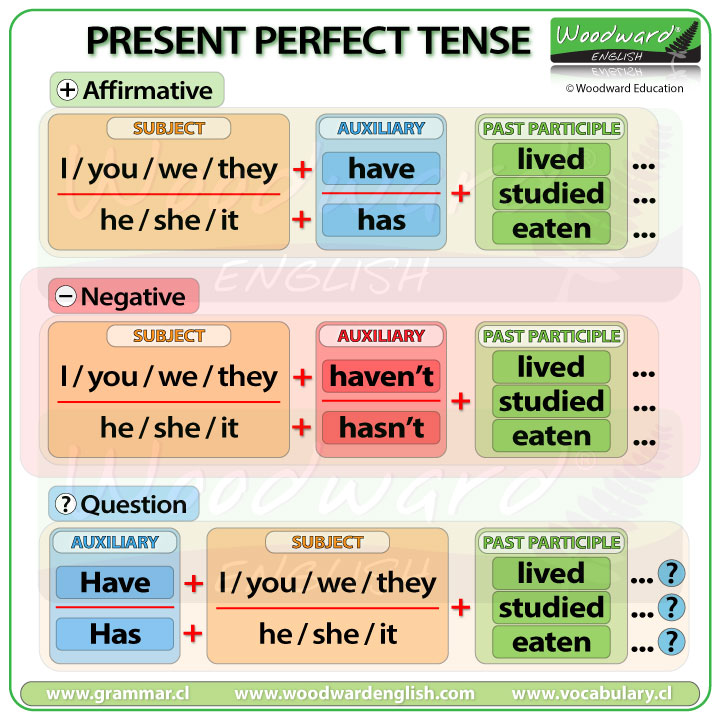
In the next lesson we are going to look at WHEN to use the present perfect tense in English.
I hope you found this lesson about the present perfect tense useful.
If you did, please let other people know about it.
